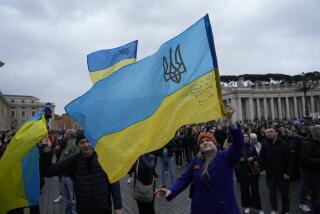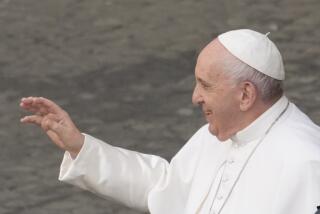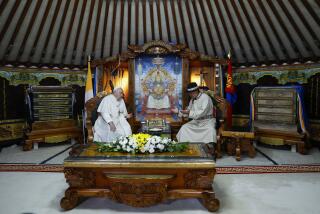THE MALTA SUMMIT : Gorbachev Visits Pope, Vows Church Freedom : Diplomacy: The two agree to restore Vatican-Kremlin ties. The pontiff welcomes an invitation to Moscow.
VATICAN CITY — Soviet President Mikhail S. Gorbachev on Friday promised full religious freedom in the Soviet Union during a meeting with Pope John Paul II in which the two leaders also agreed to restore formal diplomatic relations between the Holy See and the Kremlin.
The Pope gave his blessing to the restructuring of Soviet society going on under Gorbachev’s program of perestroika, or reform and restructuring, during their historic encounter, which bridged the bitter chasm dividing Christianity and communism.
Gorbachev invited the Pope to visit the Soviet Union. And John Paul, noting improvement in the religious climate there under perestroika, said he hoped that further developments would allow him to make a long-awaited visit.
The Soviet president, dressed in a black suit, and the Pope, in his white robes, both seemed to enjoy the encounter of two sturdy Slavs, unabashed risk-takers who have emerged from opposite doctrinal poles to become two of the most compelling figures on the world stage today.
After a 70-minute meeting with John Paul, of which the first five minutes were alone and the remainder with Russian-Polish interpreters, Gorbachev announced the agreement to resume official ties between Moscow and the Holy See, broken during the Russian Revolution in 1917.
To complete a triumphant three-day Italian visit, Gorbachev started his day in clear and cold Rome, stopped for a welcome con molto brio in staid and foggy Milan, and then flew to rainy Malta for a weekend summit with President Bush. He left bearing John Paul’s benediction to both superpowers:
“I express cordial good wishes and pray that the forthcoming talks may lead to a new understanding, one based upon a careful heeding of the needs and aspirations of peoples,” the Pope said.
Gorbachev characterized the talks with John Paul as “very substantial and very important discussions about politics and about morality.”
“Today,” the Kremlin leader said at a news conference in Milan, “politics can be serious only when they are based on common human values, which of course is also the basis of morality. We really agreed about very many things. We spoke in very serious terms. I’m very pleased with (the) talks.”
“I heard from the Pope his word of support for what our people are doing (perestroika). This is very important for us and for everyone in the world.
And on the topic of religion, Gorbachev said: “I outlined preparations for the (new Soviet) law on the freedom of conscience, and this will provide the necessary prerequisite for religious freedom.”
In the emotionally charged moment-of-history at the ornate 16th-Century papal palace Friday, it was Raisa Gorbachev who, perhaps unwittingly, lent a human dimension. Eschewing the traditional black that is de rigeur for women at private audiences with the Pope, the Soviet First Lady wore a fitted jacket and calf-length red skirt, trimmed in black velvet. Her head was bare. When the Pope handed her a gift, the russet-haired atheist professor of scientific Marxism couldn’t resist instantly opening the box for a quick peep: a mother-of-pearl rosary anchored by a gold cross.
For the Vatican, Friday’s unprecedented visit by the head of the Soviet Communist Party was a victory for decades of patient papal diplomacy toward the Communist world. This year has seen the beginnings of greater official tolerance for religion in the Soviet Union and in one country after another in socialist East Europe.
Gorbachev openly seeks the moral force of organized religion as an ally for his sweeping restructuring of an alienated Soviet society. Even as the two leaders met Friday, Soviet officials in the Ukraine were allowing members of the outlawed Eastern rite Catholic church there to inscribe themselves on an equal footing with members of other faiths. The still-pending legalization of the so-called Uniate church in the Ukraine, banned in 1946 by Josef Stalin, is a decades-old Vatican priority.
Confirming the new official view of religion in a nation that has long been aggressively atheistic, Gorbachev told the Pope that believers of many faiths, Jews to Buddhists, Christians to Muslims, live in the Soviet Union today.
“All of them have a right to satisfy their spiritual needs,” he said. “Shortly, a law on the freedom of conscience will be adopted in our country.”
In a groundbreaking speech in Rome on Wednesday night, Gorbachev depicted religion as a powerful moral force that is helping perestroika.
Praising Vatican-Soviet dialogue “which has been now consecrated by this summit meeting,” Gorbachev termed his meeting with John Paul across an antique table in the private papal library “a truly extraordinary event.”
A subsequent Vatican communique termed the private meeting “open and cordial,” and said it would further improve relations between the Holy See and the Soviet Union. The Pope, his spokesman said afterward, told the Soviet leader that he hoped pending legislation would in fact bring religious liberty to the Soviet Union.
In brief remarks of his own after the meeting, Gorbachev said he had explained to the Pope “the problems that now exist in our country, including problems between the state and various churches, which we are addressing in a spirit of democracy and humanism and within the framework of perestroika. “
“Respect for the peoples’ national, state, spiritual and cultural identity,” the Soviet leader said, “is an indispensable condition for a steady international environment, which Europe and the world now need (in order) to cross the historic watershed and attain a new period of peace.”
In a 13-minute Italian-language address that John Paul began and ended with welcoming phrases in Russian, the pontiff told Gorbachev their meeting was “singularly meaningful; a sign of the times that have slowly matured, a sign that is rich in promise.”
“The Holy See follows with great interest the process of renewal which you have set in motion in the Soviet Union,” John Paul continued. “It wishes you success and declares itself ready to support every initiative that will protect and integrate the rights and duties of individuals and peoples, so that peace may be ensured in Europe, and in the world.”
The Pope reminded Gorbachev, however, of “the painful trials to which so many citizens were subjected because of their faith” in the Soviet Union. “Recent developments and the new perspectives . . . lead us to the hope that the situation will change. . . ,” he said.
John Paul’s hand trembled as he spoke from a written text to Gorbachev, sitting next to him in the televised public addresses each leader made after their private meeting.
“I make my own the expectation of millions of your fellow citizens--and with them of millions of others throughout the world--namely that the law of freedom of conscience soon to be discussed by the Supreme Soviet will help to guarantee to all believers the full exercise of the right to religious freedoms, which, as I have said many times, is the foundation of the other freedoms,” John Paul said. His thoughts, the Pope said, went particularly to those Soviet believers, whether of the Latin, Byzantine or Armenian rite, whose churches remain in communion with Rome. The Vatican estimates that there are up to 10 million Catholics in the Soviet Union, at least 3 million of them in the Ukraine.
“I express the fervent hope that they be able to practice freely their religious life,” John Paul said.
Gorbachev added an impromptu coda to his prepared remarks after the meeting, saying: “We discussed a future papal visit.”
The Pope has made no secret of his desire to visit the Soviet Union, but has insisted that he would go only if it were possible for him to pray with Catholic communities, particularly in the Baltic republics and the Ukraine.
According to the Vatican, the Pope thanked Gorbachev for the invitation, hoping that “developments of the situation make it possible for him to accept it.”
Papal spokesman Joaquin Navarro said later: “I don’t know when, but certainly the Pope will be going some day to the Soviet Union.”
The Vatican wore its brightest face for Friday’s end of an era. The broad Via della Conciliazione leading to St. Peter’s was magically shorn of its usual overburden of pilgrim buses. Nuns joined Roman workers and tourists in the bright sunshine to wave at Gorbachev and his wife riding in a black Zil limousine surrounded by what appeared to be half the police motorcycles in Christendom. Gleaming St. Peter’s Square was scrubbed and empty. Even the pigeons were gone.
In the porticoed St. Damaso courtyard before the papal apartments, the bulky Soviet limousine flying the hammer and sickle from its right fender drew up at a thin line of saluting Swiss Guards with medieval halberds in blue and yellow striped uniforms designed by Michelangelo.
Gorbachev, flexing his hands in either nerves or anticipation, followed Vatican officials in morning coats through a series of imposing marble-floored salons to where the Pope waited, fingering his pectoral cross.
At 11:01 a.m., the two leaders reached across angry decades of hatred and oppression to shake hands. A foot or two between them, they obliged photographers before adjourning to the Pope’s library.
While the two Slavic heads of state conferred, Raisa Gorbachev became a privileged tourist, marveling at Raphael frescoes in the adjoining loggias. When she rejoined her husband, the Soviet leader, baptized Mikhail Sergeyevich by the Russian Orthodox church, took her hand:
“We have visited the highest religious authority in the world--a fellow Slav,” Gorbachev told her. She smiled, and the Pope replied:
“I am the first Slav Pope, but I am sure that providence paved the way for this meeting with President Gorbachev--and his wife.”
More to Read
Sign up for Essential California
The most important California stories and recommendations in your inbox every morning.
You may occasionally receive promotional content from the Los Angeles Times.










